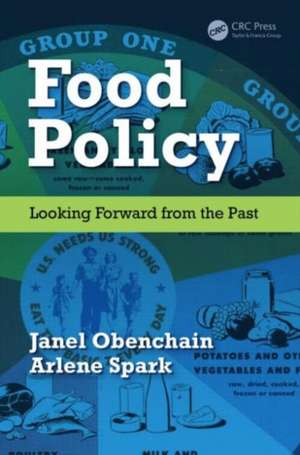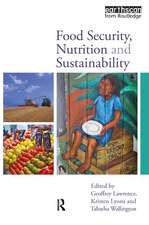Food Policy: Looking Forward from the Past
Autor Janel Obenchain, Arlene Sparken Limba Engleză Hardback – 26 aug 2015
Although the book focuses mainly on policy, it provides enough detailed nutrition information to put the policy discussion in historical context. It examines the emergence of trends, food policies, and legislation balancing issues of food, nutrition and diet-related conditions, such as obesity. It also covers food markets, sustainable agriculture, dietary guidelines and dietary allowances, food labeling, food safety, and school wellness. The book details the nuances of policy discussions and the struggles of the FDA in regulating fortification, food additives, and the development of daily values for nutrients. It also examines themes of government action versus individual liberty.
With balanced coverage of nutrition and policy issues, the book illustrates how the past gave rise to the present. It poses many questions, not the least of which is: Do we have the right to know how our food is produced? The balanced coverage of nutrition and policy issues in this book gives you the foundation to critically explore the influence of food policy on public health.
Preț: 995.07 lei
Preț vechi: 1371.35 lei
-27% Nou
Puncte Express: 1493
Preț estimativ în valută:
190.43€ • 198.08$ • 157.21£
190.43€ • 198.08$ • 157.21£
Carte tipărită la comandă
Livrare economică 14-28 aprilie
Preluare comenzi: 021 569.72.76
Specificații
ISBN-13: 9781439880241
ISBN-10: 1439880247
Pagini: 538
Ilustrații: 21 black & white illustrations, 30 black & white tables
Dimensiuni: 156 x 234 x 33 mm
Greutate: 0.91 kg
Ediția:1
Editura: CRC Press
Colecția CRC Press
ISBN-10: 1439880247
Pagini: 538
Ilustrații: 21 black & white illustrations, 30 black & white tables
Dimensiuni: 156 x 234 x 33 mm
Greutate: 0.91 kg
Ediția:1
Editura: CRC Press
Colecția CRC Press
Public țintă
Academic and Professional ReferenceCuprins
Introduction. Politics: US Food Policy I. US Food Policy II. Food Activism I. Food Activism II. Enrichment and Fortification I. Enrichment and Fortification II. Dietary Guidance I. Dietary Guidance II. An Irreverent Look at the Four Food Groups: Milk. Meat, Fish, Poultry. Grains. Fruits and Vegetables. Federal Food Assistance and Food Security. Legislation and Economics: Food Policy in Correctional Facilities. Taxation, Zoning, and Other Ordinances. Baby Friendly Hospitals. Food Safety.
Notă biografică
Janel Obenchain majored in philosophy at Northwestern University. If she had been smarter at the time she would have continued on to a PhD in philosophy. Pragmatically, she thought law school might afford better employment opportunities. And it would have, too, if she had gone to law school. Fortunately, she was waitlisted and then rejected by Stanford, as this allowed her to instead participate in a far riskier lifestyle of attempting to qualify for the 1996 Olympic team in women’s epee and working in numerous dot.com startups in the San Francisco Bay Area. Unfortunately she never made it to the top of either of these two pyramid schemes.
The details between then and her arrival at the public health program at Hunter College, City University of New York are not worth repeating. While residing in New York she studied community nutrition, including that of her own neighborhood. She worked for United Way NYC as a site evaluation consultant for food pantries and soup kitchens and, with a team of professors that included Dr. Spark, developed a policy agenda for the New York City Food and Fitness Partnership. Ms. Obenchain is the co-author of Food Policy: Looking Forward From the Past (2015).
Arlene Spark attended the City College of New York (CCNY) and Columbia University Teachers College. After majoring in English at CCNY, she worked for a year as a narcotics caseworker for the New York City Department of Social Services and then for three years as a home economics teacher at the Narcotics Addiction Control Commission (NAAC). The Commission awarded her a paid educational leave of absence for an MS in Public Health Nutrition. She subsequently earned an EdM in community nutrition and started teaching on the college level--and has been teaching on the college level ever since. A United States Public Health Traineeship allowed her to return to school to complete a doctorate in nutrition education. Dr. Spark’s career in nutrition includes 12 years of clinical practice and teaching in the Departments of Pediatrics and Community & Preventive Medicine at New York Medical College. At the American Health Foundation she was a co-PI on an NHLBI intervention study in pediatric preventive cardiology, and she served as a co-I on an NHLBI study of the elderly in the Department of Community Medicine at the Mt. Sinai School of Medicine (now the Ichan School of Medicine at Mt. Sinai). Since 1998, Dr. Spark has taught in the City University of New York (CUNY). She is professor in the masters and doctoral programs in the CUNY School of Public Health. She has a New York State Permanent Teaching license in Home Economics (it was through home economics that she discovered nutrition). She was in the first cohort of registered dietitians (RDs) to become board certified in pediatric nutrition and in the second cohort of RDs to become a Fellow of the American Dietetic Association (now the Academy of Nutrition and Dietetics). Dr. Spark is the co-author of Food Policy: Looking Forward From the Past (2015). She lives in Demarest, New Jersey, almost 3000 miles away from her daughter and grandsons in Davis, California.
The details between then and her arrival at the public health program at Hunter College, City University of New York are not worth repeating. While residing in New York she studied community nutrition, including that of her own neighborhood. She worked for United Way NYC as a site evaluation consultant for food pantries and soup kitchens and, with a team of professors that included Dr. Spark, developed a policy agenda for the New York City Food and Fitness Partnership. Ms. Obenchain is the co-author of Food Policy: Looking Forward From the Past (2015).
Arlene Spark attended the City College of New York (CCNY) and Columbia University Teachers College. After majoring in English at CCNY, she worked for a year as a narcotics caseworker for the New York City Department of Social Services and then for three years as a home economics teacher at the Narcotics Addiction Control Commission (NAAC). The Commission awarded her a paid educational leave of absence for an MS in Public Health Nutrition. She subsequently earned an EdM in community nutrition and started teaching on the college level--and has been teaching on the college level ever since. A United States Public Health Traineeship allowed her to return to school to complete a doctorate in nutrition education. Dr. Spark’s career in nutrition includes 12 years of clinical practice and teaching in the Departments of Pediatrics and Community & Preventive Medicine at New York Medical College. At the American Health Foundation she was a co-PI on an NHLBI intervention study in pediatric preventive cardiology, and she served as a co-I on an NHLBI study of the elderly in the Department of Community Medicine at the Mt. Sinai School of Medicine (now the Ichan School of Medicine at Mt. Sinai). Since 1998, Dr. Spark has taught in the City University of New York (CUNY). She is professor in the masters and doctoral programs in the CUNY School of Public Health. She has a New York State Permanent Teaching license in Home Economics (it was through home economics that she discovered nutrition). She was in the first cohort of registered dietitians (RDs) to become board certified in pediatric nutrition and in the second cohort of RDs to become a Fellow of the American Dietetic Association (now the Academy of Nutrition and Dietetics). Dr. Spark is the co-author of Food Policy: Looking Forward From the Past (2015). She lives in Demarest, New Jersey, almost 3000 miles away from her daughter and grandsons in Davis, California.
Descriere
Access to safe, adequate, and nutritionally balanced food is a cornerstone of public health. This book examines the influences of grassroots movements, the government, and industry on the US food systems. It examines the emergence of trends, food policies, and legislation balancing issues of food, nutrition and diet-related conditions, such as obesity. The authors address such topics as food markets, sustainable agriculture, dietary guidelines and dietary allowances, food labeling, food safety, and school wellness. Containing profiles of notable contributors to the field, the text also explores themes of government action versus individual liberty.

















